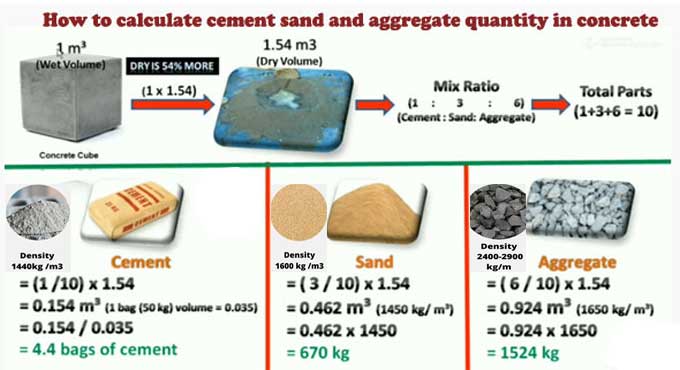
Density Requirements in Cement, Sand, and Aggregate for better Building Construction

Density is defined as mass per unit of substance volume of a substance i.e. unit weight of that respective substance. Line (p) denotes as symbolic form of Density .It describes as material compactness that means the higher the density of substance more compacted the material is.
Cement Density
1. Concrete density has increased its strength and durability. By doing this process density of cement has got least concern.
2. Cement act as binder in a concrete, knowing its density will be very useful to change the concrete characteristics. The standard density of Cement has 1440kg/m3.
Density of Sand
- Sand comprise in near about 35% concrete volumes. Careful mixing of cement, fine and coarse aggregates, water and admixtures produced to be good quality concrete.
- For the construction use, River sand also known as Natural sand has a bulk density of 1.71 kg/m3.
- M- Sand also known as Manufactured Sand is a prime alternative to Natural Sand which has the bulk density of 1.75kg/m3.
Density of Aggregate
Inert granular materials of non metallic substances such as sand, gravel, or crushed stone clusters in to Aggregates. Concrete obtained in the particles form and processed with water and Portland cement. It has two types, there are fine aggregate and coarse aggregate.
Fine Aggregate: It is basically natural sand, washing and sieving processes have done to remove unwanted size particles. All particles above 5mm knows as good quality of fine aggregates.
Coarse Sggregate: It is a type of gravel that is crushed, washed, and sieved to a different size from 5 to 50mm.
Aggregate Bulk Density
Aggregate bulk density explains as Mass or Weight of the selected aggregate with a container filled with volume of specific unit.
Bulk density = Mass / volume
Unit- kg/m3 or lb/ft3
RCC Density
- Reinforced cement concrete is also known as RCC increases the tensile strength of concrete. Concrete is good compression and weak tension. Mild steel bars reinforce to improve the tensile strength to concrete.
- The adequate concrete strength keeps high to the density of RCC. The material compactness is measured by Density, RCC needs to be well compacted without any gap.
- The standard Density of RCC is 2500kg/m3.
PCC Density
- Aggregate density, air content, water and cement content are the main factors of concrete density. PCC Density is influenced by the maximum aggregate size. Concrete provides a large unit weights diversity.
- The standard Density of PCC is 2400 kg/m3.
- PCC density is used in cement concrete foundation.
FAQ
What are Fine Aggregate Density and its range?
It is ranging between 1450kg/m3 to 2082 kg/m3 depending on different conditions.
What are Coarse Aggregate Density and its range?
Same as Fine Aggregate Density mentioned above.
What is Cement Density?
Cement Density is 2.8 gram per cubic centimeter or 1440 kg per cubic meter.
What is Density of Sand?
The sand density is1680 kg/m3
Bulk Density of Sand
The approximate bulk density of fine aggregate makes concrete is between 1520kg/m3 to 1680kg/m3.
Define the Density of Crushed Sand and uses?
Partial replacement of fine aggregate in construction uses Crushed Sand. The density of M or crush sand is 1750kg/m3.
What is the range of concrete for Coarse Aggregate Density?
The Coarse Aggregate Density used in concrete that lies between 2400kg/m3 to 2900kg/m3.
Density of Concrete?
The Concrete Density varies around 2400 kg per cubic meter.
What is Density of Concrete Kn/m3 in unreinforced concrete??
The Density of concrete is about 2400 Kn/m3 for unreinforced concrete.
Density of Concrete per Cubic Foot
The density of normal concrete is about 145 lbs per cubic foot.
Fine Sand Density in kg/m3?
2082 kg/m3
Density of River Sand in kg/m3
Average sand river density is 1650 kg/m3.


